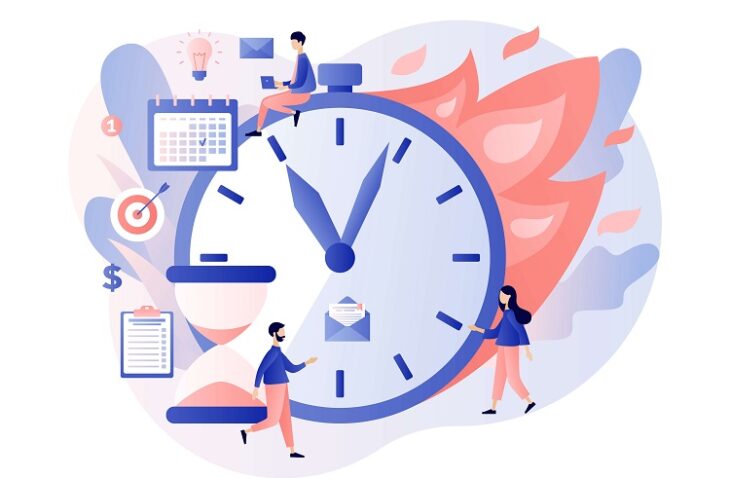Time is perhaps the most important commodity of all, and balancing our time is a skill that can make a huge difference in our lives.
Be careful with how you use your time, use it wisely, and you’ll have some time left over to spend how you choose.
However, if you procrastinate and waste your time, you’ll find you’re always rushing around and you’ll feel like you simply never have a moment to yourself.
Use these time management hacks to streamline the way you use your time, and you’ll have more time to spend relaxing and enjoying life!
Get up Earlier

Have you ever thought that there simply aren’t enough hours in the day to get everything done?
You can’t add more hours into your day, but you can get up earlier and make use of more time.
It may take a while to get into a routine, allowing your body to adjust to an earlier start, but there are many benefits. An earlier start can give you a peaceful time to get things done without distraction.
Perhaps you’re starting with the housework before your family gets up, or you’re arriving at the office before everyone else gets there.
Either way, just one extra hour of quality time each morning can really help you get on track for the day.
Whatever you use that hour for, perhaps it’s simply to have your morning cuppa and catch up on your emails, it’s saving you time later in the morning.
Get a Good Night’s Sleep
But getting up earlier is only going to work if you’re not left feeling exhausted and as if you haven’t had enough sleep.
A good night’s sleep will ensure you wake up feeling refreshed and not sluggish and lackluster.
Keeping to a regular bedtime really does help, as your body associates that time with relaxing and shutting down.
Try and make your bedroom a calming environment, and ensure it’s dark, quiet, and not too hot or cold.
It can be very tempting to look at your phone in bed, but this really is not advised as the blue light given out by mobile devices tricks the brain into thinking it is morning, and suddenly you’ll feel wide awake, so if you can, leave your phone outside of the bedroom, or put it on silent so at least you won’t be disturbed by a late-night email or notification coming in.
Create a Morning Routine
What we do first thing in the morning can make a big impact on our day.
Some of us may not feel on top form right away at the start of the day, so having a routine can also help us get on with things rather than wasting our time chatting, looking on Facebook, or drinking too much coffee.
Once you have a routine, you can simply follow it every morning and you’ll be super organized. Think of all the important tasks that should take priority every morning.
You’ll want to check your emails and in-tray, then once you have a list of tasks that need attending to, you should prioritize them.
Ensuring you reply to emails, or inform colleagues of tasks you’ve delegated to them in a timely manner means that other people too can get on with their work and the whole business will run more efficiently.
Schedule Your Day
Ever start out the day on a positive note, get loads done in the first hour, then look at the clock and it’s suddenly early evening?
Time has a way of running away with us and playing tricks on us if we’re not careful!
Keep a closer eye on what you’re actually doing all day by setting yourself a schedule.
Create a list of everything you want to achieve in the day, estimate the length of time each task will take you, then set a time for everything.
You should also schedule some breaks too, that way you’ll stay on track and won’t be tempted to ditch your schedule because you’re feeling too tired and in need of a change of scenery.
Prioritize
When it comes to time management skills, prioritizing is everything.
It doesn’t matter how much time you spend working if you’re concentrating on non-essential tasks and leaving those that are the most important undone.
Productivity levels are important, but you need to focus your productivity where it is most needed.
Prioritizing is a skill that takes time to master. You really need to think carefully and create an order or priority for every task you have.
When a new job comes in, you need to slot it into your list. It can be tempting to get several non-vital jobs completed simply because they are small tasks, but equally, that could result in one large and vital job being put back, risking a missed deadline.
Prioritizing is a skill that you can work on though. When you make an error, remember and readjust your processes.
Turn off Email Notifications
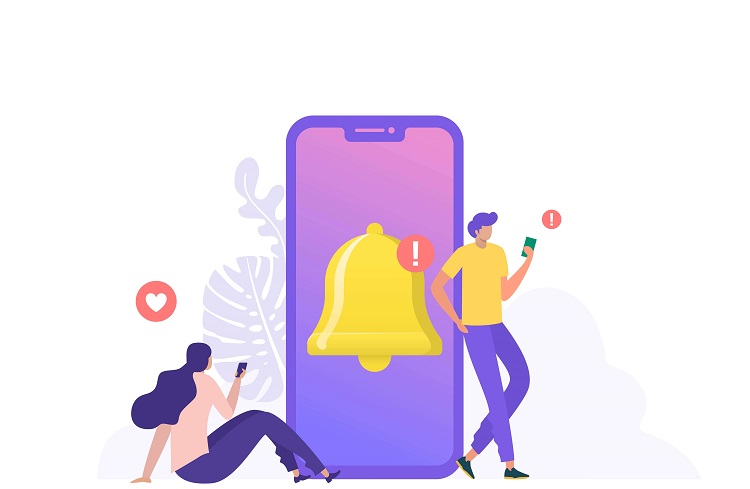
When you hear the notification noise of an email coming in, do you instantly stop everything to see what it is?
This can be incredibly counterproductive, and there is seldom an urgency to read an email.
If something was so important it needed immediate attention, no one would email, they would pick up the phone and speak to you.
When you stop what you’re doing to read every email, you’re turning your mind away from the job at hand and it takes time to refocus when you return to what you were doing. You may even forget what you were doing while focusing on the content of the email, and end up leaving something incomplete.
So turn off those email notifications and read them all together at set times of the day.
Set Aside Specific Times for Email
So if you’ve turned off the email notifications, you’re then at risk of getting involved in other things and forgetting to check them at all, so you need to have specific times each day when you attend to your emails.
First thing in the morning is the perfect time to read your emails as their content may have an impact on your day and may provide you with information you need to prioritize tasks and schedule your day.
Checking again around lunchtime is something productive you can do while you take a break, and again perhaps an hour before you finish for the day, giving you time to address anything important and add items to your next day’s schedule, without being in a rush.
Anything unseen then can wait until the next morning.
Don’t be tempted to quickly check again before you leave, or you could find yourself stuck at your desk for another hour.
Limit Social Media Time
Social media really is the enemy of time.
You can be just taking a quick peek at Instagram or going on Facebook to wish someone a Happy Birthday, and suddenly an hour has gone by as you spotted an interesting article to read, or browsed through your friend’s holiday photos.
Social media can be great fun, and very useful for keeping in touch with friends and family, but it can take up so much time if you let it.
Perhaps set an alarm if you don’t trust yourself to keep your social media time brief, or set yourself a time to browse online at your leisure outside of your working hours, so it doesn’t interfere with your job.
Track your Time
Having realistic expectations of how long particular tasks take is incredibly useful, but surprisingly difficult.
We may flippantly say that something is a five-minute job, but in reality, that is seldom the case.
By the time we’ve gathered information about the job, corresponded about the job, do the job, and reported back that the task is complete, it’s highly likely that a lot more time has passed than the aforementioned five minutes!
So it’s a good idea to time yourself when you complete a task that you perform regularly, to give yourself a rough idea of how long each activity takes.
Get Rid of Clutter
A tidy environment makes for a tidy mind, and being organized can certainly save you time.
From a practical point of view, having a tidy and well-organized office and desk will save you time looking for that important file or locating a pen that works.
Clear out old and unwanted paperwork, and finding just what you need will be quicker. Taking time to create a good, efficient filing system is well worth it.
Working in a clean and organized environment is also good for the mind, and will help to keep stress levels low.
Being surrounded by junk and clutter can make you feel overwhelmed which can lead to task avoidance and time-wasting.
Create the Perfect Work Environment

Studies show that the more pleasant the work environment, the more productive the workers.
So by ensuring your workspace is comfortable and visually appealing, you’re likely to get more done.
There are several aspects you should consider. Putting up some beautiful artwork or adding an attractive potted plant to your desk can certainly be beneficial, but there are some practical aspects to consider too.
Is your seat comfortable and at the correct height for your desk?
Is your office at the right temperature, not too hot or too cold?
Are you getting plenty of natural light and do you have a quiet space to think or are you always bombarded with external noise?
Some problems are hard to fix, but there are often workarounds that can at least enhance your workspace to make it a more pleasant environment to spend your time in. After all, most of us spend more time sitting in our offices than we do with our spouses!
Find your Peak Performance Time
Being aware of when you’re most productive can really help you to manage your time better. Start to pay attention to how you feel at certain times of day, how well you can concentrate, and at what times your attention wanders.
We’re all different, some of us find it hard to focus early in the day, while others may find that they are at their most productive at that time.
When you understand how your mind and body work at different times of day, you can use that information to your advantage and delegate tasks to yourself that fit your mood at any particular time.
If you’re a little sluggish in the mornings, then that’s a great time to tackle those simple but necessary tasks, leaving the more difficult tasks to that time after lunch when you’re firing on all cylinders.
Sometimes fighting your own state of mind and forcing yourself to do something can be counterintuitive, particularly if tiredness or hunger adversely affects your work performance.
Protect your Boundaries
We can all waste our own time, but others can take up massive portions of our time too.
Do you work in an environment where people stop by your desk and expect you to stop what you’re doing to talk to them?
This is annoying if it’s a work-related conversation, but it’s infuriating you’re right in the middle of doing something important and they’ve stopped to tell you a joke or let you know what their plans are for the weekend.
If other people are constantly stealing your time, you need to let them know that when you’re concentrating, you’re not to be disturbed.
You can make this totally clear with a Do Not Disturb sign that you display when you’re really busy.
They’ll soon get the idea, and you’ll get back some quality working hours.
Take Breaks
It can be tempting to simply forge on and keep working until you’ve crossed everything off your list. But in reality, there’s often a constant stream of new jobs to be done, and before you’ve finished, it’s the end of the working day.
Working non-stop is bad for both your physical and mental health.
If you’re not careful you’ll suffer mental burnout or end up with a health condition such as chronic back pain that results in time off work.
That’s so counterintuitive, you work hard to save time, then end up taking time off sick!
So do make sure you take time out to rest both your body and your brain.
Have a complete change of scenery, go to another room if you can, talk to someone about something totally unrelated to work, or take a stroll outside and look around you.
Focussing on objects in the distance is great for tired eyes that have been looking at a screen all day.
Successful people know the value of downtime.
Exercise
So many of us spend hours and hours sitting at our desks.
If you’re a self-employed business owner or a freelancer, you’re not getting paid when you’re not working, and the pressure is on you to ensure that everything gets done.
So it’s tempting to work long hours without taking a break.
Then when we do take a break, we’re so tired all we want to do is browse Facebook or sit in front of the TV for a while.
However, making an effort to add some exercise into your daily routine can actually help you a great deal.
It can really help clear the mind and it’s brilliant for loosening up tight muscles when you’ve been sitting in an office chair for hours.
If you find you’re not progressing with a task as well as you should be, take a short walk and come back to it, you’ll be amazed at how revitalized you feel.
Use a Calendar App
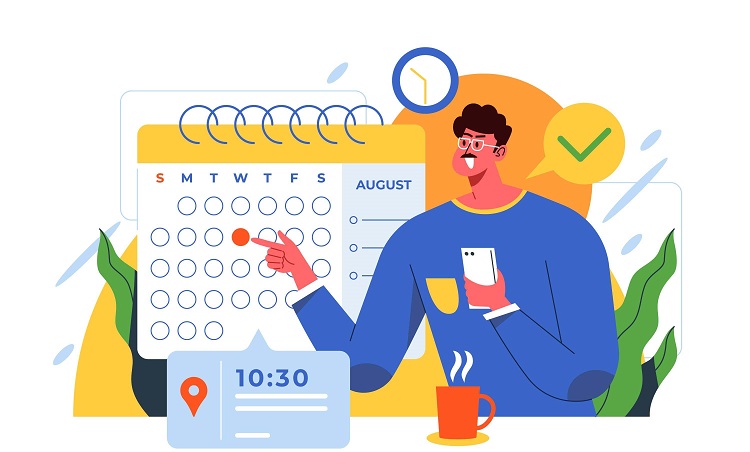
Keeping track of appointments, meetings, and deadlines can be a minefield.
Sometimes there’s just so much going on that we lose track of what we’re doing when we miss something important and a meeting may have to be rescheduled, inconveniencing everyone involved.
When you jot down dates on a piece of paper it can easily go astray, discarded accidentally as trash.
A wall-hanging calendar is only any good if you refer to it daily to see if you have anything on that day and even if you spot an event in time, you may not be best prepared for it.
By using a calendar app on your mobile device you can add in everything you need to do, and you can access it at any time so you’ll never double book your time.
You’ll be able to set alarms and notifications and get advance warnings of anything upcoming that needs you to do some preparatory work.
Break Large Projects into Smaller Tasks
It’s incredibly hard to manage your time effectively and make plans for your time management going forward with a project when it’s one big unknown mass.
It’s tough to make time estimates, so setting realistic deadlines becomes virtually impossible and the sheer scale of a large task can make it all seem overly daunting.
So begin to break down large projects into smaller, more manageable, and more easily accountable chunks.
Perhaps there’s a design phase, a consultation process, perhaps there are distinct sections the project can be divided into.
Remember to set aside time for testing or proofreading, for reassessing and making further changes once the client or your boss can see the finished product.
By doing this you can set yourself milestones, allocate daily tasks, and you’ll feel as if you’re actually getting somewhere which is great for personal motivation.
Stop Multitasking and Focus on One Thing at a Time
When we try to do too many things at once, we can end up doing nothing at all.
Do you get partway through a task, and then get a call or email and so you work on that, and then you remember something else you had to do, so you start on with that task too?
Constantly multitasking is a really unproductive way to work. Focussing on one thing at a time is the best way to get the most done in the shortest time.
When another task comes your way, write it down, then finish what you were working on. Then you can look at your list. Important things can be given priority and short tasks can be completed quickly to get them off the list, but just do one thing at a time and ditch the multitasking.
Set Goals
Goals come in all sizes, and while you may have some major career goals, setting realistic goals, even on a daily basis, can really spur you on and keep you on schedule.
Self-motivation is perhaps the hardest thing to maintain in the long term, so setting goals can give you the inspiration you need.
You may set a goal to finish a task before lunchtime or reward yourself with a coffee from your favorite coffee shop when you’ve ticked everything off your list.
Setting goals for others is also a good management hack.
Experiment with Time-Tracker or Checklist Apps
Many time management techniques require you to know how long particular tasks are going to take you, but our estimations of this can often be far from reality.
Even when we’ve finished an important task, we may not know how long it has taken us as we didn’t make a note of our start time.
By using time tracker apps you can begin to get a clearer and more accurate picture of how long each different task takes.
This can be good for setting budgets, particularly if you’re a freelancer, and also for setting realistic time goals.
In addition, checklist apps are a great way to ensure all your tasks are in one place, and you can check them off when they are complete.
You’ll always have your list to hand, even when you’re out of the office, and you won’t misplace it as you could a handwritten list.
Set Detailed Reminders
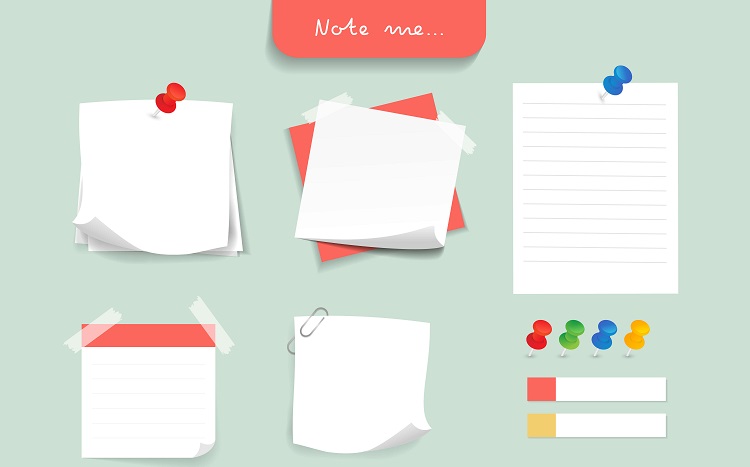
When you’ve prioritized your specific tasks, there will be some jobs on your task list that you don’t need to complete right away, but they do need doing at some point.
So when you’ve scheduled date and time for each job, set yourself a reminder, on your phone or computer, and add in plenty of detail.
When the task is fresh in your mind, it’s easy to think you’ll remember all about it, but a week later when a mysterious reminder pops up telling you to ‘Prepare a report for Bob’ are you going to remember what report you’re referring to?
Keep Your Focus
Are you easily distracted?
Perhaps you’re working on a task, then suddenly you think about a recipe you’d like to make later, or you suddenly wonder what the weather forecast is for the weekend.
Do you then disappear off to Google as the time ticks away while you’re doing something totally unrelated and productivity totally goes out of the window?
If you work from home, then there’s a whole host of things that can take your attention away. You might just put a load of washing on, or you spot something that needs tidying up.
While we recommend taking regular breaks, it’s important to schedule them, and not stop working to do something unrelated on a regular basis as time will disappear before you know it, and no amount of time management hacks are going to help you.
Keep Looking for More Time Management Tips
Every productivity hack and management tip you read can be valuable, so searching out more time management hacks and keeping on top of new innovations to help you manage your time is always a good idea.
We all need a break, and reading up on how to make better use of your time is certainly a great use of your break time!
You can search Google and blog posts for time management tips that are relevant to you, such as tips for working in a crowded office or working from home tips.
Set Deadlines for Everything
Without a set time to finish a task, you can put it off and put it off again.
You may have final deadlines for a large project, or a deadline set by a client, but if a project is large, break it down into smaller parts and set deadlines for each aspect of it.
If a task is a very low priority, it may never get done and eventually be forgotten about, unless you set a deadline for it.
Even if that deadline is far in the future when you look at your schedule, you’ll be reminded that the job still needs to be done, and so it’s more likely to be attended to.
Make the Most of Waiting Times
We all spend time waiting. It might be waiting for a train, waiting to be connected on a call, or waiting for other people to arrive at a meeting.
It’s amazing the time you can save when you do something productive while you’re waiting.
Make a call, reply to an email, and make some notes to help you with your next project.
Every small task you complete while you’re waiting is one less job to do later, increasing your productivity.
You could even put together a list of short tasks specifically to be worked through when you’re simply doing nothing else and have a little time to fill.
Try to Eliminate Distractions
Being distracted can lose us so much time and reduce our productivity. Even a minor distraction can make us lose our train of thought and we have to start a process all over again.
So many of us have had to work from home during the pandemic, with spouses and kids in the house and we’ve truly seen how distracting life can be!
In an office, can you delegate answering the phone to someone else?
Even if it’s just for an hour or two, you can assign your most complicated tasks that require all your concentration, to be done in those hours.
If you work from home, you need to ensure your family understands that you’re not to be disturbed while you’re working unless it’s an emergency.
Delegate
They say if you want a job doing well, do it yourself, but if you take on everything, you’ll end up swamped with work.
Sometimes we can become precious over our work.
Salespeople may have ‘their’ contacts’ and feel they don’t want anyone else to deal with them or you simply want to ensure that a job is done the way you want it, but your staff or colleagues won’t learn unless they have that experience, so delegating tasks can be of benefit to all in the long run.
Perhaps you can simply delegate smaller tasks to others, to at least free up some of your time so you can focus fully on a specific task that’s of the most importance.
Successful people are good delegators.
Don’t Let Work Get you Down
No matter how vital it feels, your job is not more important than your health, your mental well-being, or your relationships with your family and friends.
Maintaining a good work / personal life balance is so important.
Our jobs can bring us great satisfaction, and if you love your job then that’s fantastic, but most people have times when their job feels like a hard slog.
It’s so important to put it in perspective. Cut yourself some slack and don’t strive for perfection.
At the end of the day, your job is just one part of your life, so don’t make it the whole of it.
Take time to appreciate everything else you have, spend time with your family, and take time out to do those things you enjoy.
If you’re constantly working because you have deadlines, then you’re setting deadlines that are too tight.
Learn to Say No
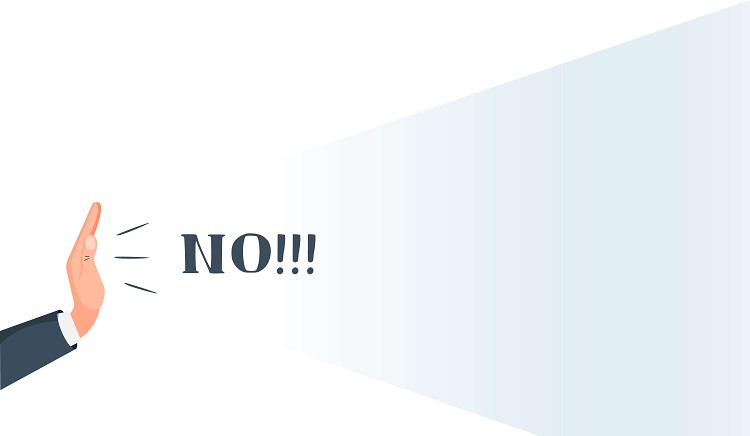
Are you a yes person? When someone asks you to do something, do you automatically say “Yes, no problem” knowing full well that it really is a problem as you’re already snowed under and it’s going to take you ages?
Once people get to know that you’ll take on anything with a smile, they could well start bringing jobs to you that they really could do themselves.
Of course, it’s nice to help people out, but it’s also important to not fill your in-tray with so many jobs you can’t do a good job.
Overpromising can result in disappointment when you miss deadlines or deliver under-par results. Learning to say no is a vital skill, particularly if you’re a freelancer.
Inform clients of your realistic expectations. Let them know that you’d be happy to work on their urgent project, but you’re unavailable until next week.
Sometimes ‘urgent’ work isn’t as urgent as people make out, and you may still be able to complete the job, at a time that works better for you.
A Change is as Good as a Rest
If you’re feeling overwhelmed with your workload, sometimes simply changing tasks can make you feel less swamped.
When you keep a good To-Do list, you can pick out a smaller task from your list and get that done instead. It’s like taking a break without taking a break.
Often we become so involved in something that we don’t see the big picture.
Stepping away from the job at hand and returning to it later can really help, be it spotting errors in an important document, or finding a bug in a piece of software.
Leave Buffer Time In-Between
When you’re putting together a schedule, don’t fill every minute of every day.
Some tasks may take longer than you think, and so then you’ll end up behind schedule with little chance of catching up. This can cause stress and anxiety.
Add in buffer time, so if you get your job done on time, or early, you can either take a well-deserved break or get a head start on your next job.
It’s a much more positive way to work and it reduces stress levels.
End your Day on a Good Note
It’s so important to put yourself in a positive frame of mind before you end your working day.
If you have left your day with issues unresolved, they can linger in your mind and adversely affect your ability to relax and unwind, which is really important.
You should give yourself a ‘begin to wind down’ time each day, a little before your official finishing time. You can then deal with any correspondence, and get to a good stopping point.
If you’ve successfully finished a task, and it’s gone well, you should consider calling it a day there rather than beginning a new task.
This applies to every person, with sales reps stopping after a sale rather than adding in just one more call of the day, to management working late to tick some more jobs off the to-do list.
Your time at home, with family or friends is important for your mental well-being, so manage your end-of-day routine to ensure you don’t take your work home with you.
FAQ
What are the 4 D’s of time management?
The 4 D’s of time management are:
Delete – Get rid of unnecessary tasks and clutter.
Delegate – Reassign jobs to those best suited to the task.
Defer – Postpone non-urgent tasks so urgent business is attended to first.
Do – Get on with the job and don’t procrastinate!
What is the MoSCoW prioritization technique?
The MoSCoW technique is a method of prioritizing features of a product before the start of the development or creation process and ensuring that everyone understands what is most important.
Every feature falls into one of four categories; Must have, Should have, Could have, and Won’t have.
What are the 4 levels of prioritizing tasks?
Whenever a new task arrives with you, you should ensure you prioritize it correctly. It can help to use the 4 levels of prioritizing tasks which are; Urgent and Important – tasks to be done immediately with the highest priority.
Urgent but not important – Time-sensitive tasks that need to be done soon but are not vital.
Important but not Urgent – Vital tasks that can be put on the back burner but must not be forgotten about.
Neither Important nor Urgent – Tasks that should be done at some point but are not a priority.
How many items should be on a To-Do list?
What goes on your To-Do list is a personal choice. Some people feel overwhelmed with a long list, while others like to tick off all the smaller tasks as they feel they are getting more done that way.
Anything that is part of your routine doesn’t need to be on your list, but anything that you may forget should certainly be listed.
What is poor time management?
Poor time management is often signified by rushing around all day, being really busy, yet still not getting everything done.
Procrastinating, easily being distracted, and working on low-priority tasks while the most important jobs are waiting to be completed are all signs of poor time management skills.
What is effective time management?
Someone who is good at time management will complete their workload and find time to spare for leisure and hobbies.
An effective time manager will have a feeling of satisfaction at the amount of work they have completed in the day, without feeling burned out and exhausted and without compromising on productivity.
Summary
We hope you’ve spent your time wisely reading these time management hacks and have learned some life skills that can be put to good use on a daily basis to streamline your time, boost your productivity, and ensure you have plenty of time left over to enjoy yourself.
With some time tips and hacks, you can gain control of your day and become an effective time manager.
Successful people know how to get things done and manage their time, and so these skills are vital for anyone looking to boost their career as well as their overall well-being.
